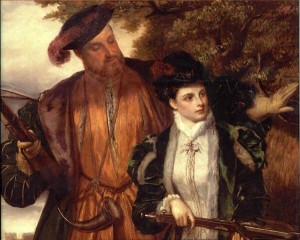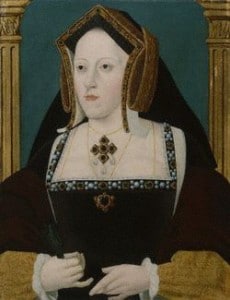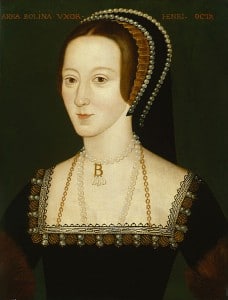 As I said in my post “Henry VIII Falls in Love with Anne Boleyn”, Eric Ives gives a very useful chronology of Anne and Henry’s relationship, from Shrovetide 1526 to August 1527 when it was decided that Henry should ask the Pope for a dispensation to allow him to marry Anne when he had already had carnal relations with her sister, Mary Boleyn.
As I said in my post “Henry VIII Falls in Love with Anne Boleyn”, Eric Ives gives a very useful chronology of Anne and Henry’s relationship, from Shrovetide 1526 to August 1527 when it was decided that Henry should ask the Pope for a dispensation to allow him to marry Anne when he had already had carnal relations with her sister, Mary Boleyn.
But Henry and Anne did not marry until January 1533 so what happened in the intervening five and a half years? Well, here’s a chronology from February 1528 until 1533:-
1528 – The King’s Great Matter
- February 1528 – Stephen Gardiner is sent to Rome with Edward Fox to argue “The King’s Great Matter”.
- June 1528 – Anne goes into quarantine at Hever when one of her ladies is taken ill with sweating sickness. Anne becomes ill but survives.
- September 1528 – Due to Cardinal Campeggio’s imminent arrival for the Legatine Court, Henry sends Anne Boleyn to Hever and continues to live with Catherine of Aragon. Henry even had the gall to announce to the court, judges and citizens on the 8th November 1528 that he was only questioning his marriage because he had been told by “diverse great clerks” that it was “directly against God’s law and his precept” and that “if it be adiudged by J law of God that she [Catherine] is my lawfull wife, there was neuer thyng more pleasaunt nor more acceptable to me in my lifebothe for the discharge & cleryng of rny conscience & also for the good qualities and condicions the which I know to be in her… so that if I were to mary againe if the mariage might be good I would surely chose her aboue all other women.”1
- 8th October 1528 – Arrival of Cardinal Campeggio, the Papal Legate.
- November 1528 – Mendoza reports “The lady who is the cause of this King’s misconduct (desorden), perceiving that her marriage, which she considered as certain, is being put off, begins to suspect that the Cardinal of England is preventing it as much as he can, from fear of losing his power the moment she becomes Queen [of England]. This suspicion [of the lady] has been the cause of her forming an alliance with her father [Viscount Rochford], and with the two Dukes of Norfolk and Suffolk, to try and see whether they can conjointly ruin (desbaratar) the Cardinal. Hitherto they seem to have made no impression on the King, save that the Cardinal is no longer received at Court as graciously as before, and that now and then King Henry has uttered certain angry words respecting him.”2
- 9th December 1528 – Du Bellay reports “Mademoiselle de Boulan is at last come thither, and the King has lodged her in a very fine lodging, which he has prepared for her close by his own. Greater court is now paid to her every day than has been to the Queen for a long time. I see they mean to accustom the people by degrees to endure her, so that when the great blow comes it may not be thought strange.”3

1529 – The Fight for Annulment
- 1529 – Anne Boleyn acquires a copy of William Tyndale’s “The Obedience of the Christian Man and How Christian Rulers Ought to Govern” and later draws Henry’s attention to passages regarding the idea that a ruler is accountable to God alone and that the Church should not control a monarch.
- 31st May 1529 – Opening of the Legatine Court at Blackfriars.
- 21st June 1529 – Catherine of Aragon gives her impassioned speech at the court.
- July 1529 – Cardinal Campeggio adjourns the court for the summer. It never sits again because Catherine is successful in appealing to Rome.
- 1st September 1529 – Chapuys reports “The King’s affection for La Bolaing (Boleyn) increases daily. It is so great just now that it can hardly be greater; such is the intimacy and familiarity in which they live at present. May God remedy it all!”4
- 7th October 1529 – Letter from Pope Clement VII to Henry VIII “Has suspended his cause. Assures him that the dispensation was a positive and not a divine law; and if the Queen, as she affirms, was not known by prince Arthur, there is no doubt that the dispensation was perfectly sound in foro conscientiæ. Begs him to consider the danger in which Christendom stands from the Turks, and how much it is enhanced by this dispute. Rome, 7 Oct. 1529.”5
- 9th October 1529 – Cardinal Wolsey charged with praemunire.6
- St Andrews Day (30th November) 1529 – Catherine confronts Henry saying “that she had long been suffering the pains of Purgatory on earth, and that she was very badly treated”. Henry replies, saying that “she ought to know that he was not her legitimate husband, as innumerable doctors and canonists, all men of honour and probity, and even his own almoner, Doctor Lee, who had once known her in Spain, were ready to maintain” and that “should not the Pope, in conformity with the above opinions so expressed, declare their marriage null and void, then in that case he (the King) would denounce the Pope as a heretic, and marry whom he pleased.”7
- 8th December 1529 – Thomas Boleyn is given the titles Earl of Ormonde and Earl of Wiltshire.8
- 13th December 1529 – Chapuys reports that the King “gave a grand fête in this city, to which several ladies of the Court were invited (among them queen Blanche and the two duchesses of Norfolk, the dowager and the young one), the Lady Anne taking precedence of them all, and being made to sit by the King’s side, occupying the very place allotted to a crowned queen”9.
- Christmas 1529 – Henry celebrates Christmas at Greenwich with Catherine.
1530 – The Fall of Wolsey and the Rise of Anne Boleyn
- January 1530 – Thomas Boleyn is made Lord Privy Seal10.
- 6th February 1530 – Chapuys reports “The Queen is treated as badly and even worse than ever. The King avoids her company as much as he can. He is always here with the Lady, whilst the Queen is at Richmond. He has never been half so long without visiting her as he is at present, giving as an excuse or pretence that some one has died of the plague near her residence. He has also resumed his attempts to persuade her to become a nun; this, however, is but a delusion and loss of time, for the Queen will never condescend to consent to it.”11.
- 12th February 1530 – Wolsey is pardoned and restored to favour.
- 12th June 1530 – Chapuys reports a meeting where “it was asked why the King should not (having obtained the opinion of so many competent judges on this matter) marry at once, without awaiting any further approval of his conduct, especially as he had cause to be suspicious of the Pope”12, an idea put forward by Cranmer.
- June 1530 – Henry is given the Collectanea satis copiosa, a set of papers consisting of “scriptural, patristic and historical arguments which demonstrated – or claimed to demonstrate – that there was no warrant for the centuries-old assumption that the pope was supreme in spiritual matters. Henry would therefore be justified in taking into his own hands the solution of his matrimonial problem.”13
- October 1530 – A papal edict is sent to Henry ordering him to return to Catherine.
- 15th October 1530 – Chapuys reports that Henry “called together the clergy and lawyers of this country to ascertain whether in virtue of the privileges possessed by this kingdom, Parliament could and would enact that notwithstanding the Pope’s prohibition, this cause of the divorce be decided by the archbishop of Canterbury”14.
- 4th November 1530 – Arrest of Cardinal Wolsey.
- 29th November 1530 – Death of Wolsey – Wolsey was travelling to London to answer charges of treason.
1531 – The Supreme Head of the Church
- 5th January 1531 – Pope Clement VII forbids Henry VIII to remarry and threatens him with excommunication if he does
- 7th February 1531 – Convocation ordered to recognise Henry as “sole protector and supreme head of the English church and clergy”15. The resulting “haggling” results in Thomas Cromwell adding the phrase “so far as the law of Christ allows”.
- 11th February 1531 – Convocation granted Henry VIII the title of “singular protector, supreme lord, and even, so far as the law of Christ allows, supreme head of the English church and clergy”.
- 1531 – Henry’s plan of marrying Anne is met by hostility from Nicholas Carewe, the Duke of Suffolk, the Duchess of Norfolk, Bishop Fisher, Reginald Pole, Elizabeth Barton (“the Nun of Kent” and many others.
- Spring 1531 – Renovations begin at York Place where Anne is being lodged.

1532 – A Queen in All But Name
- New Year 1532 – Anne and Henry exchange gifts (a set of boars spears for Henry and a set of hangings for Anne) while Henry forbids courtiers to give gifts to Catherine. Catherine sends Henry a gold cup but Henry sends it back to her after an outburst from Anne.16
- June 1532 – Thomas More resigns as Lord Chancellor and is replaced by Thomas Audley, who becomes Lord Chancellor on 26th January 1533.
- July 1532 – Chapuys reports “The King, either hearing from Rome or expecting that the Pope will decree censures to cause him to take back the Queen and banish the Lady, has said publicly, and in great anger, that he would not allow the Pope to treat him as he had done, that the Pope had no power over him; he was resolved to celebrate this marriage in the most solemn manner possible, and the necessary preparations must be made.”17
- 1st September 1532 – Anne is made Marquis of Pembroke
- September 1532 – Work starts on refurbishing the royal lodgings in the Tower of London in preparation for Anne’s coronation.18
- 1st October 1532 – Chapuys reports Henry stripping Catherine of her jewels so that he can give them to Anne.
- 11th October 1532 – Anne and Henry leave England for France where she is treated like his queen.
- 12th November 1532 – Anne and Henry leave France for England. Sometime during their trip, either in France or in Dover, they consummate their relationship.
- 14th November 1532, St Erkenwald’s Day – Henry and Anne arrive at Dover and, according to Edward Hall, marry secretly19.
1533 – Anne Becomes Queen
- 25th January 1533 – Henry VIII and Anne Boleyn marry in a secret ceremony.
- February 1533 – Anne talks of a craving for apples, she is pregnant.
- March 1533 – Henry’s court preachers proclaim the “virtues and secret merits” of Anne Boleyn while proclaiming that his marriage to Catherine is invalid.20
- 26th March 1533 – Convocation is asked to pronounce on the validity of a papal dispensation allowing a man to marry his brother’s widow.
- 30th March 1533 – Thomas Cranmer is consecrated as Archbishop of Canterbury.
- End of March 1533 – Anne’s royal household is formed.
- 5th April 1533 – On the 5th April 1533, Convocation determined “1, that the Pope has no power of dispensing in case of a marriage where the brother’s widow has been cognita. The house consisted of 66 theologians. The proxies were 197 ; the negatives 19. The second question was, whether Katharine was cognita. The numbers present, 44 ; one holding the proxies of three bishops. Decided in the affirmative against five or six negatives.”
- 9th April 1533 – Catherine of Aragon is informed that she has been demoted from Queen to Dowager Princess of Wales.
- 11th April 1533, Good Friday – Archbishop Cranmer writes to the King asking for his permission “to determine his great cause of matrimony” and Henry VIII informs his Council that Anne is his rightful wife and Queen and that she should be accorded with royal honours.
- 12th April 1533 – Henry VIII replies to Cranmer, giving him “licence”, and Anne Boleyn attends Mass as Queen.
- 10th May 1533 – Archbishop Cranmer opens a special trial into the annulment proceedings at Dunstable Priory.
- 23rd May 1533 – The Dunstable trial declares that Henry VIII’s marriage to Catherine of Aragon has been annulled.
- 28th May 1533 – Archbishop Cranmer proclaims the validity of Henry VIII’s marriage to Anne Boleyn after a special enquiry at Lambeth Palace.
- 29th May 1533 – Anne Boleyn’s coronation pageantry begins.
- 30th May 1533 – 18 Knights of the Bath are created.
- 31st May 1533 – Anne Boleyn’s coronation procession.
- 1st June 1533 – Anne is crowned Queen after three days of pageantry, processions and celebrations.
- 26th August 1533 – Anne goes into confinement for the birth of her baby.
- 7th September 1533 – Princess Elizabeth, the future Elizabeth I, is born.
Notes and Sources
- Hall’s Chronicle, p754 and 755
- Calendar of State Papers, Spain, Volume 3 Part 2: 1527-1529 (1877), p885
- LP iv.5016
- Calendar of State Papers, Spain, Volume 4 Part 1: Henry VIII, 1529-1530, pp. 188-203
- LP iv. 5994
- LP iv.6000
- Calendar of State Papers, Spain, Volume 4 Part 1: Henry VIII, 1529-1530, pp. 337-363.
- LP iv. 6083
- Calendar of State Papers, Spain, Volume 4 Part 1: Henry VIII, 1529-1530 (1879), pp. 363-374.
- LP iv.6154
- Calendar of State Papers, Spain, Volume 4 Part 1: Henry VIII, 1529-1530, pp. 444-457.
- Calendar of State Papers, Spain, Volume 4 Part 1: Henry VIII, 1529-1530, pp. 585-604.
- The Life and Death of Anne Boleyn, Eric Ives, p135-136
- Calendar of State Papers, Spain, Volume 4 Part 1: Henry VIII, 1529-1530, pp. 753-766.
- Ives, p138 quoting Guy in English Historical Review, 97.
- Ives, p149.
- LP v.1202
- LP v.1307
- Hall’s Chronicle, p794
- Ives, p164